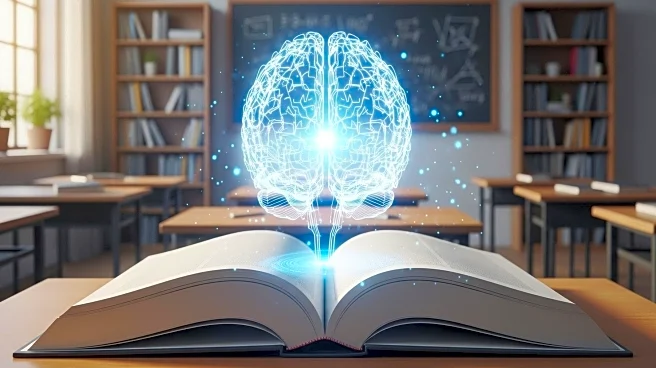What's Happening?
A growing number of educators are voicing concerns about the rapid integration of generative artificial intelligence (AI) in K-12 classrooms. While some educators and technology advocates see AI as a beneficial tool for teaching and learning, others are skeptical about its impact. A survey conducted by the EdWeek Research Center found that educators are divided on AI's influence, with 47% believing it will negatively affect teaching and learning, while 43% see it as positive. Teachers like Dylan Kane, Jed Williams, and Elizabeth Bacon have expressed reservations about AI's role in education, citing issues such as the potential stunting of critical-thinking skills, privacy concerns, and the lack of meaningful justification for AI's use in schools.
Why It's Important?
The debate over AI in education is significant as it touches on broader issues of educational quality, teacher autonomy, and student development. The integration of AI tools could potentially streamline certain educational processes, but it also raises concerns about the erosion of critical-thinking skills and the over-reliance on technology. Educators worry that AI might replace essential teaching practices and diminish the role of teachers in crafting personalized learning experiences. Additionally, the privacy and ethical implications of using AI in classrooms are critical, as they involve sensitive data about students and teachers. The outcome of this debate could shape future educational policies and the role of technology in schools.
What's Next?
As schools and districts continue to explore AI's potential, there will likely be increased scrutiny and demand for clear guidelines on its use. Educators and policymakers may need to engage in more comprehensive discussions about the ethical and practical implications of AI in education. Professional development programs might evolve to include more critical analysis of AI tools, ensuring that teachers are equipped to make informed decisions about their use. The ongoing dialogue could lead to more balanced approaches that integrate AI while preserving the core values of education.
Beyond the Headlines
The integration of AI in education could lead to long-term shifts in how teaching is perceived and practiced. It raises questions about the future role of educators and the potential for technology to redefine educational norms. The ethical considerations surrounding AI, such as data privacy and the potential for bias in AI-generated content, could prompt broader societal discussions about technology's role in shaping human interactions and learning processes.









